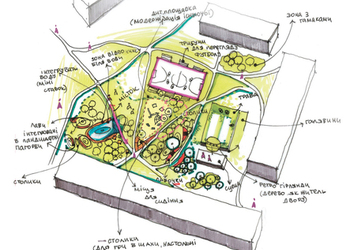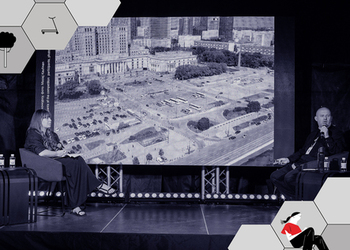We, representatives of civil society organizations, grassroots initiatives, local governments, professional and academic communities gathered at the fifth Ukrainian Urban Forum "Common House" on July 28-29, 2023 in Vinnytsia to discuss the development and recovery of Ukraine and our cities.
We condemn the Russian war against Ukraine, which began in 2014 and became full-scale on February 24, 2022. We honour the memory of all those who died as a result of the actions of the Russian army. We are grateful to the Armed Forces of Ukraine, which protect our lives, freedom and well-being.
The challenges that Ukrainian society and our cities face are rooted in the history of imperial and Soviet colonialism, as well as the complex path of economic, social and political changes and transformations since independence. Today, we are living through a tragic and turning point in history: the Russian army takes human lives every day, destroys cities and villages, and deprives us of a sense of security and home. Many challenges are becoming more complicated and exacerbated. At the same time, recovery and European integration give a chance for qualitative transformations that require planning of long-term solutions and development strategies.
The full recovery of Ukraine is impossible without the restoration of territorial integrity and de-occupation of all territories, which is the main priority for the state and society. Despite this, work on recovery has already begun.
The recovery process should include not only the physical reconstruction of cities and communities but also the update of principles and approaches to public policies. Recovery is a complex process that requires multi-level governance, as well as active and open dialogue and partnership with civil society. An important precondition of the recovery is the development of capable institutions, both at the national and local levels, that will take responsibility for the development and implementation of sustainable solutions and programs.
The key principles of recovery should be:
● Justice, which means the rule of law, inclusiveness, the practical implementation of human rights and prioritizing the needs of those most in need of support. ● Participation, which means civic participation, involvement and consideration of the needs of various social groups and stakeholders in the development and implementation of public policies and programs with a special focus on early involvement, transparency, as well as proper and timely informing. ● Subsidiarity, which means solving problems at the lowest possible level of government, where it can be done efficiently and effectively.
● Credibility, which means being based on high-quality and reliable data, research results, as well as critical analysis of previous experience and possible consequences of implemented solutions and programs.
● Sustainability, which means long-term planning and consideration of total life cycles, striving for climate neutrality, care for future generations, and preservation and restoration of nature.
Providing decent housing for those who need it, in particular, due to losses caused by the war, is the main task of the recovery of Ukrainian cities and hromadas. Housing is an inalienable human right and basic urban infrastructure. The state, cities and hromadas, as well as civil society, should work together to provide housing for people from different social groups, in particular, vulnerable categories of the population, taking into account their needs and capabilities.
Updating the housing policy requires comprehensive research and the collection of reliable data, organizing a broad public dialogue to review approaches to housing policy, updating national legislation, approving the state housing strategy, creating a national housing agency and a unified housing register, developing the social housing sector and creating conditions for work for the providers of social housing, strengthening the protection of rights in the housing sphere, for example, by creating a housing ombudsman institute.
Structural sectoral changes are also important for the recovery of Ukrainian cities and hromadas, in particular, the completion of the decentralization reform, updating the regional policy on the basis of cohesion and subsidiarity; strengthening the capacity of hromadas to provide social services; creating a barrier-free urban environment; development of sustainable urban mobility with prioritization of pedestrian and bicycle traffic, as well as public transport; integration of nature-oriented solutions into urban design and adaptation to climate change; strengthening the role of hromadas and civil society in urban planning to protect public interests in the processes of urban development, as well as the implementation of inclusive zoning; creation of infrastructure for the development of local communities and reduction of spatial inequalities in large cities.
The values of mutual aid and mutual support, which mobilized communities in response to Russian aggression, should become the key principles of the state's functioning. The development of human potential and individual freedom are possible only in a solidary society that provides support and creates conditions for a decent life. Human dignity, as well as responsibility, solidarity and freedom are the basis of the development and recovery of Ukrainian cities and hromadas.
You can sign the declaration by following the link.


